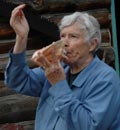Improv Notes: September 2011
 IMprov Notes: News of the Moment September 2011 Guelph comes alive at the
2011 Guelph Jazz Festival  Above is a picture of the Mash Potato Mashers, a unique 8 piece parade style band from Ottawa and mobile dance party, whom could be found invigorating the Nuit Blanche crowds at various outdoor locations around downtown Guelph. It was the type of atmosphere—populated by a unified community of creative listeners and musicians engaged in dialogue with one another— that lead many attendees to passionately tell Ajay Heble (Artistic Director of the Guelph Jazz Festival and ICASP Project Director) that the “city came alive like never before." It truly was an another exciting festival & colloquium with something for everyone: From a stimulating colloquium which included electrifying workshops, fusing painting, poetry, jazz, and plastic intervention  (Alain Debex, Jazzmoart, Nicolas Caloia, Jean Derome, Isaiah Ceccarelli, and Guillaume Dostaler) to sonic and scopic multimedia exchanges  (Paul Watkins and Nick Loess) to fusions of poetry and music  (Kevin McNeilly reading from his new book of poetry, Embouchure, with an improvised musical accompaniment by Eric Lewis on trumpet) and, of course, the music. Christine Duncan and the Element Choir celebrate the human voice  The Stretch Orchestra dazzle audiences with a wide gamut of musical styles  was jam-packed for free communal shows. Including Jane Bunnett with the KidsAbility Youth Ensemble  later the crowd grooved with Shane Phillip's soul-infused tribute to the late Gil-Scott-Heron  There was also captivating River Run shows, such as Australia's The Necks, who provided audiences with a unique tapestry of sound  to the coalescing jazz, funk, and Hip Hop rhythms of The Hypnotic Brass Ensemble  Like last year, Nuit Blanche was jam packed with excitment. from art installations in garages  to early morning installation/performances  ("Pulses" by Jesse Stewart) culminating with an amazing early (6:15am) solo bass performance by acclaimed bass player and improviser William Parker.  It seems appropriate that a rainbow should shine over Guelph following Parker's performance.  (7:15am outside the MacDonald Stewart Art Centre) Missed the fun? Make sure you catch next year's festivities! All photos by Paul Watkins |
|
|
|

 Connecting to Facebook
Connecting to Facebook



